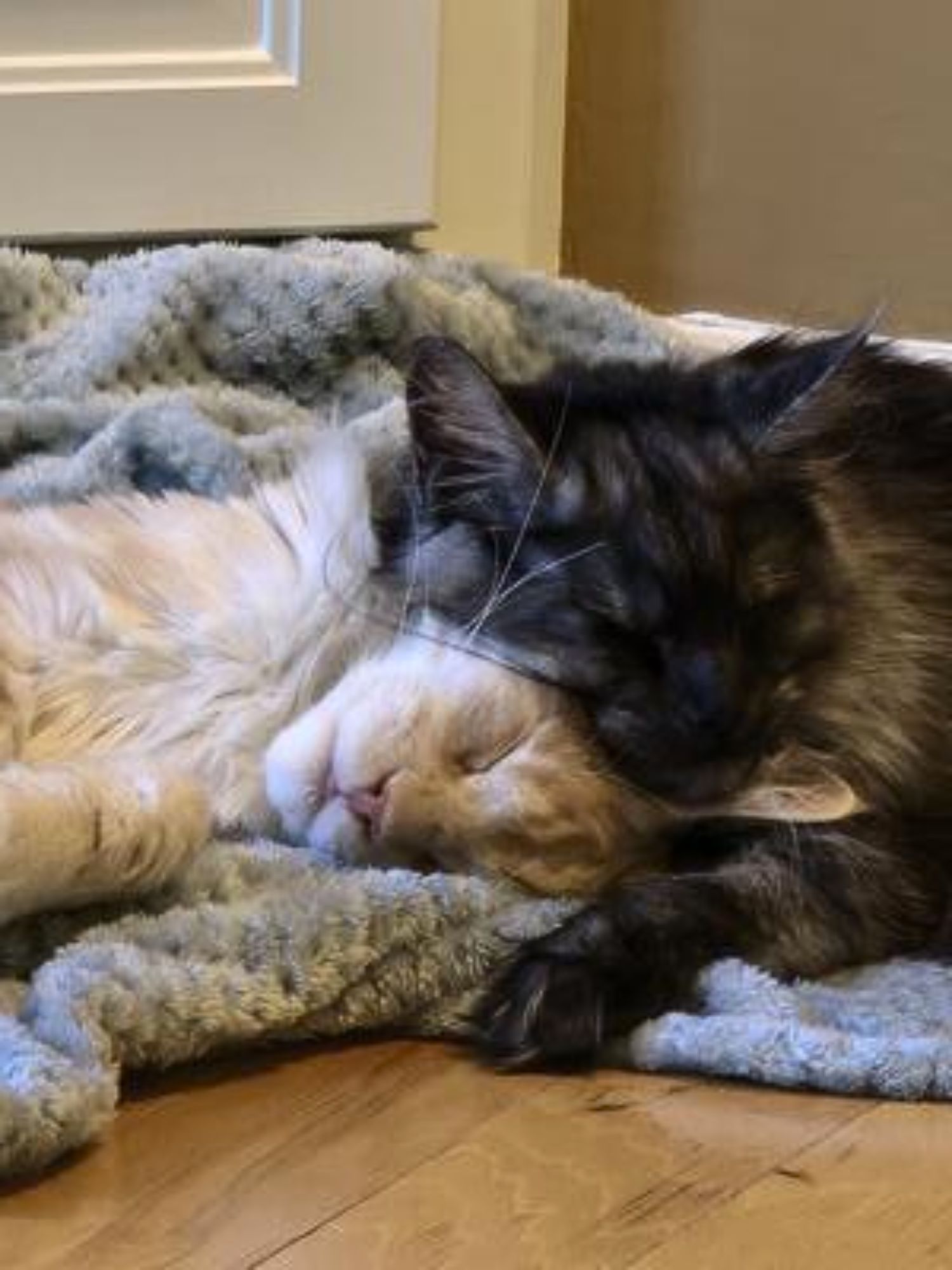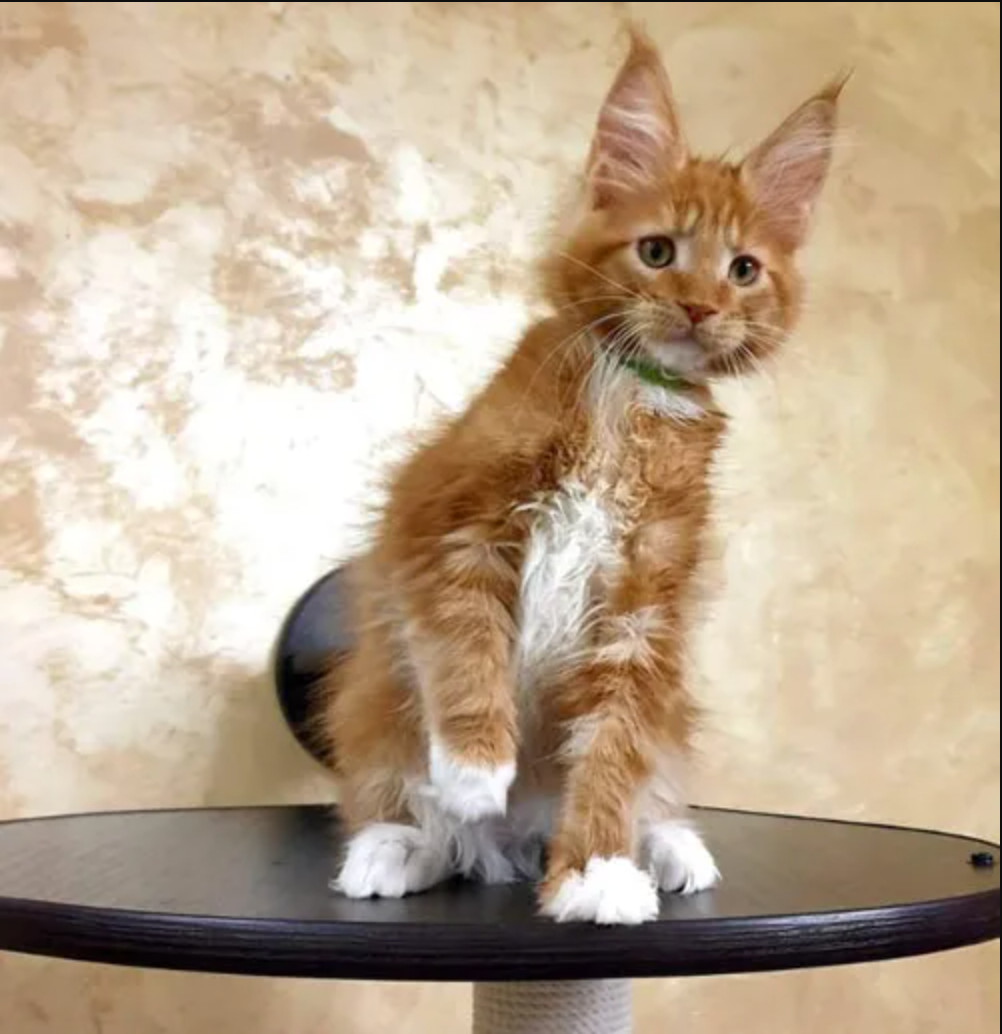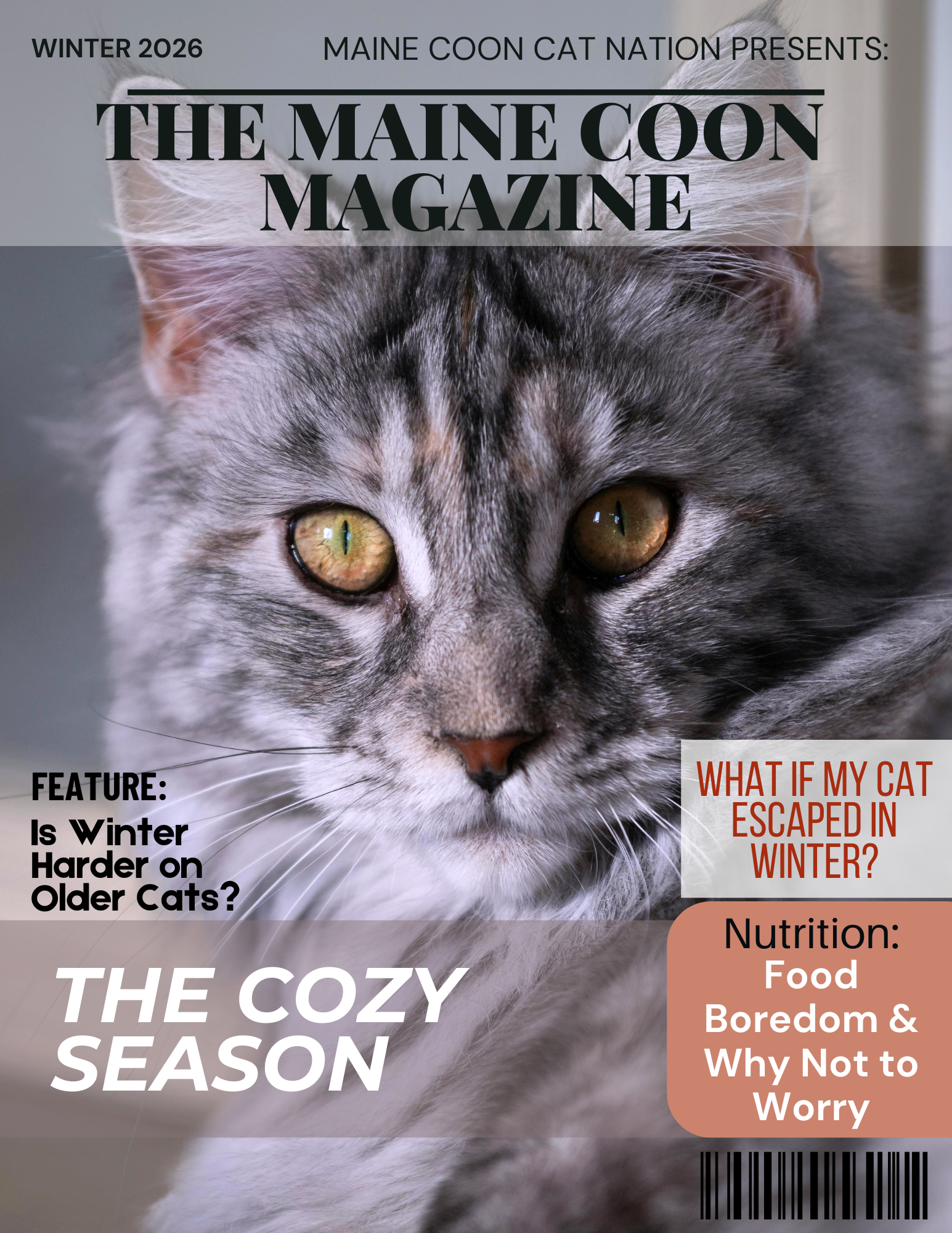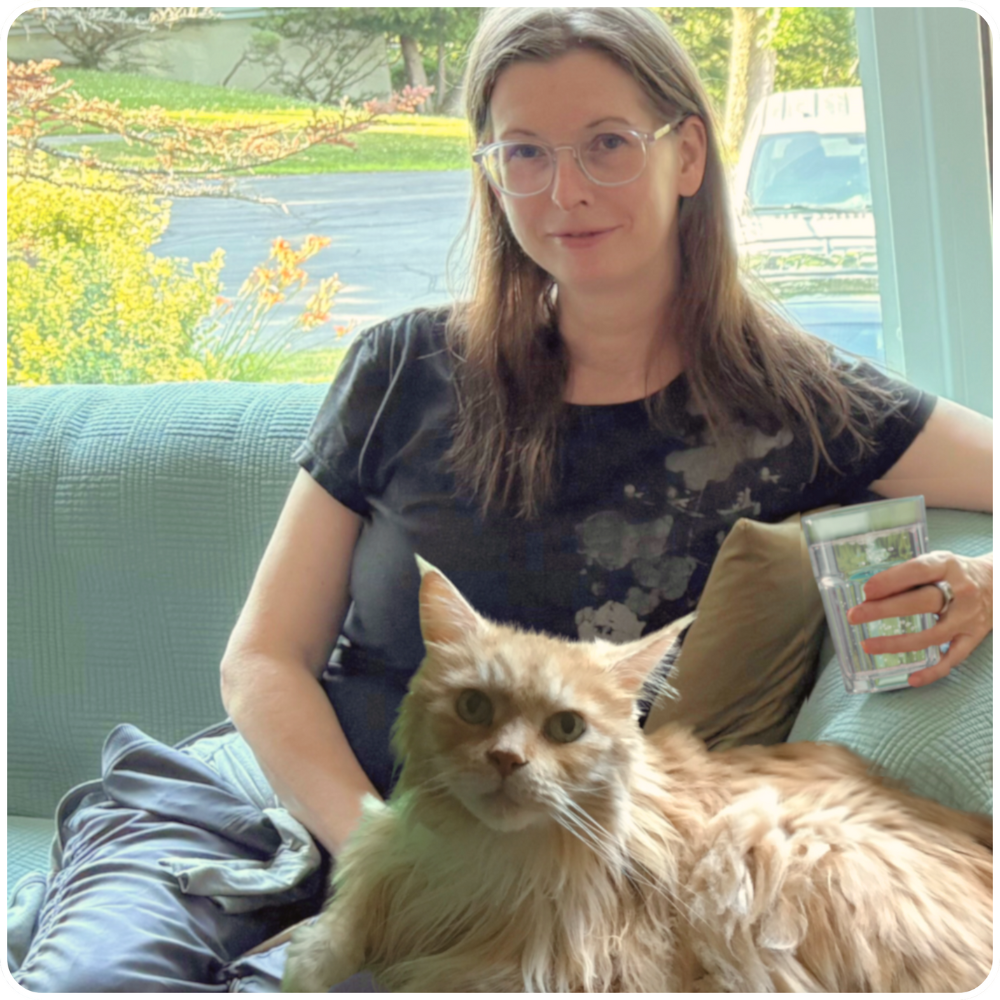- Home
- How to Find a Coonie
- What is a Cattery?
Inside a Top Maine Coon Kitten Cattery
What "Cattery" Actually Means
If you've ever heard the term Maine Coon cattery and pictured some kind of mysterious kitten factory, you're not alone.
People who are new to all this often imagine a big facility with rows of cages, maybe a vet on staff, or even a boarding area where cats stay while they "wait their turn."
Some folks wonder if it's the feline equivalent of a puppy mill.
If you like this, you'll love our fun, free Daily Digest!

In reality, a cattery is almost never like that. It's not a clinic or a kennel, and it's definitely not a warehouse full of kittens.
A Maine Coon cattery is simply a breeder’s home - set up for their cats to live safely, comfortably, and cleanly!
Think spare bedrooms turned into kitten nurseries, sunny playrooms filled with towers and tunnels, and a laundry room that somehow doubles as a kitten playground. It's cozy, lived-in, and deeply personal.
 Finn and Pippi
Finn and PippiOn our testimonials page, Mike shares Finn and Pippi, saying they're: "from a great cattery here in Tennessee called Oak Grove Farms.
Sarah is a kind and caring breeder, so our brother and sister kitties are very socialized."
Every breeder does it a little differently, but the good ones are basically running a tiny, cat-centric household built around their queens and kittens.
Once you understand that, the word cattery stops sounding mysterious. It's just the name for the home base where a breeder raises and cares for their cats, nothing more formal than that.
What You’ll Find (and Won’t Find)
If you've ever pictured a Maine Coon cattery as something like a mini animal hospital or a fancy boarding facility, that's totally understandable.
To someone just getting into the breed, it sounds like a big official operation, maybe with staff and a front desk.
And on occasion the term is actually used for a boarding facility (a place to tend to your feline family member while you are away).
But what you'll actually find inside a real cattery is much more down-to-earth: the breeder's own Coonies, their kittens, and the dedicated spaces where those kitties are cared for.
You might meet the queens (the moms) and sometimes the studs (the dads), depending on the setup.
There's usually a whole rhythm to the home and places for feeding, playtime, naptime. Just like any well-run household with pets.
What you won't find are boarding services, drop-off care, or a vet's office tucked in the back.
Breeders work closely with veterinarians, of course, but they don't run one. Their focus is entirely on the cats they raise, the health records they maintain, and the pedigrees that trace each line.
So when you hear someone mention reputable catteries, think home-based, hands-on, and centered around the well-being of every feline there - not some mysterious facility behind closed doors.
How Good Catteries Work
A good Maine Coon cattery runs more like a well-loved household than a business. The routine is steady and predictable, which helps kittens grow up confident and calm.
Kittens are raised right in the home, not in rows of cages. They learn early what it means to be around people, doing things like playing with children and dogs, hearing vacuums, footsteps, laughter, being handled - all the normal household sounds that shape a well-adjusted feline.
Behind the scenes, breeders in a Maine Coon kitten cattery keep detailed records, track growth, and maintain spotless routines. It's not glamorous work, but it's constant, careful, and built on love for the breed.
That's what really sets great catteries apart. Not fancy setups, but steady, personal care that produces healthy, happy kittens ready for their new families.
Breeders like Maine Street Cats in California keep things exactly as you'd hope - small, home-based, and full of life.
Gary's cats are raised right in the house, following the rhythms of everyday living. Kittens grow up underfoot, making them easygoing companions later on.

Gary shares: "I hit the floor in the morning and head for the coffee pot. Once that's going, I start feeding and there’s no peace until everyone's eaten.
As I type, I've got a 16-week-old kitten batting at my hands. When I'm home, my Maine Coons are involved in everything I do… they wouldn’t have it any other way."
Signs of a Reputable Cattery
If you've never worked with a breeder before, it can be hard to tell what separates the good ones from the rest.
A top Maine Coon kitten cattery doesn't just say they care - you can feel it in how open and professional they are from the start.
They're registered with a recognized cat association and are happy to explain what that means.
They'll answer questions about health testing, show you photos of where the kittens are raised, and talk through what to expect when you bring one home.
Good catteries don't make you chase information. They stay in touch, send updates, and are upfront about timing, pricing, and their process.
Some even offer video calls so you can see the kittens in real time - a great sign that they're proud of their setup and have nothing to hide.
It's that mix of warmth and transparency that sets reputable breeders apart.
You should walk away from every chat feeling like you just talked to someone who genuinely loves their Coonies, not like you're dealing with a business transaction.
Breeders such as Yellowstonecoon (PA) show what transparency looks like in action.
Jessica openly shares her cats' health testing, registration info, and updates right on her cattery page - a good sign of a breeder who takes both the cats and communication seriously.
When to Be Cautious
If someone calls themselves a breeder but won't show photos, provide references, or explain their setup, that’s a red flag.
Real Maine Coon catteries are proud of what they do! They want you to see how their kittens are raised, and want to see that you are interested and invested in the process.
Be wary of anyone who dodges questions, offers to "ship immediately," or avoids talking about health testing and pedigrees.
A good breeder has nothing to hide. Scammers, on the other hand, rely on keeping things vague and urgent. If the vibe feels off, trust your gut and walk away.
FAQ: Common Questions About Catteries
What is a closed cattery?
The idea of a closed cattery really took off during COVID, when breeders couldn't safely welcome visitors into their homes. Instead, they relied on video calls and photos to stay connected with families waiting for kittens.
These days, you'll still see some breeders say something like "for the health of our kittens, we run a closed cattery" - meaning they don't allow in-person visits.
That's often for good reason: young kittens have developing immune systems, and visitors can unknowingly bring in viruses, bacteria, or even parasites on their shoes or clothing.
A closed setup helps protect both kittens and adult Coonies from illness.
With that said, scammers now use the "closed cattery" excuse to avoid showing proof of their existence.
So always verify references, registration, and legitimacy before trusting that claim.
Do breeders ever allow visits?
Some do! Once trust is built and the kittens are older, many breeders offer in-person meetups or video chats so you can see where your future kitty is being raised.
Each breeder sets their own boundaries, but the best ones are transparent and willing to show their setup somehow, even if it's virtual.
Is a cattery the same as a kennel or shelter?
No, totally different thing. Kennels and shelters house multiple animals, often temporarily.
A cattery is a small, home-based setup where one breeder raises their own cats and kittens. Picture a family home, not a facility.
Why are kittens sometimes not shown until a certain age?
Many breeders wait until around 6 to 8 weeks before sharing photos or offering selections.
Before that, the babies are too young and fragile to be handled much. It's not secrecy, it's just protection and good timing.
Another reason is that breeders need time to see how each kitten develops before deciding whether to keep one for their own breeding or show program.
How can I tell if a breeder is legitimate?
Look for registration with a recognized cat association, clear communication, health testing info, and consistent photos or updates.
Real Maine Coon catteries are proud of what they do and don't hide behind excuses or pressure tactics.
At The End of The Day
A cattery isn't some mysterious breeding facility. It's a home built around the care of a few special felines.
It's where someone spends every day cleaning litter boxes, bottle-feeding babies, chatting with families, and falling a little more in love with each Coonie they raise.
Many of the breeders featured in our community, like Yellowstonecoon and Maine Street Cats, handle things this same way - with openness, structure, and genuine love for their cats.
That's really all it means. Behind every healthy, well-adjusted kitten is a breeder quietly doing the work with love, ethics, and a bit of organized chaos!
Now that you know what a cattery really is, head back to our main page for more about finding Maine Coon kittens and choosing the right breeder for you!

